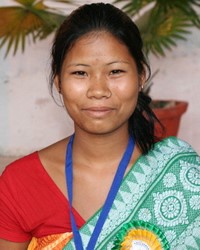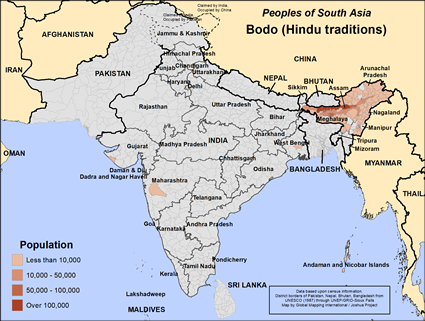Bodo (Hindu traditions) in India

Photo Source:
Ramesh Lalwani - Flickr
Creative Commons
|

Map Source:
People Group data: Omid. Map geography: UNESCO / GMI. Map Design: Joshua Project.
|
| People Name: | Bodo (Hindu traditions) |
| Country: | India |
| 10/40 Window: | Yes |
| Population: | 1,471,000 |
| World Population: | 1,491,700 |
| Primary Language: | Boro (India) |
| Primary Religion: | Hinduism |
| Christian Adherents: | 9.94 % |
| Evangelicals: | 0.00 % |
| Scripture: | Complete Bible |
| Ministry Resources: | Yes |
| Jesus Film: | Yes |
| Audio Recordings: | Yes |
| People Cluster: | South Asia Tribal - other |
| Affinity Bloc: | South Asian Peoples |
| Progress Level: |
|
Introduction / History
They have many tribes and were once dominant in Assam. The Bodo are a people mostly living in Assam in India, mainly in the north region of the Brahmaputra River Valley. They also live in Bangladesh. The Bodo are wanting to be a self-ruling state, and this has been and is causing disputes and much trouble as a result.
What Are Their Lives Like?
The Bodo speak a Tibeto-Burmese language, and they read and write in Devanagari. Many are farmers. They eat rice and fish and pork. They like to drink rice wine. The Bodo like to dance. The Bodo weave and make bamboo items.
What Are Their Beliefs?
Some of the Bodo follow Brahmoism which is a Hindu reform movement. Amongst the Bodo there are Christians too. Some of the Bodo follow Bathouism in which they worship ancestors. They believe that people come from a mixture of sky, earth, air, water and fire. They like to worship near home or in a courtyard. Betel leaves and rice are used for example as offerings. Their most important festival is called Kherai Puja, and the altar is put in a rice field. Bathoubwrai is the main deity in Bathouism.
What Are Their Needs?
The Bodo people need the chance to hear and respond to Jesus Christ's offer of abundant life.
Prayer Points
Pray that Christian materials will bring the Bodo to Jesus Christ.
Pray that the Christians among them will lead the other Bodo to salvation.
Pray that the disputes and trouble regarding self-governing will come to a peaceful end
and that a just solution will be found.